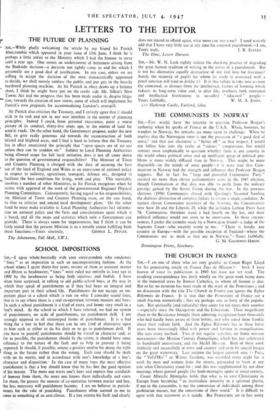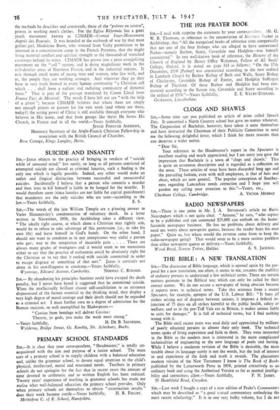THE CHURCH IN FRANCE
SIR,-I am one of those who are very grateful to Canon Roger Lloyd for his penetrating article on France Pays de Mission ?- bock I have known of since its publication in 1943 but have not yet read. The resulting correspondence has dwelt wholly on the great work being done in the industrial areas by Roman Catholics, to whom all honour is due. But so far no mention has been made of the work of the Protestants ; and no discussion with the title The Church in France can ignore the Eglise Reformie de France. It is true that the Protestants of France are a small fraction numerically ; they are perhaps one in forty of the popula- tion. But spiritually (and culturally) they count for ten times their number —especially since the Occupation and the Liberation. Their magnificent share in the Resistance brought them admiring recognition from thousands who had hardly been aware of them before, and who asked them frankly about their radiant faith. And the Eglise Reformee has in these latter years been increasingly filled with power and fervour in evangelisation. She uses every method. Two of her regular activities arc home mission movements—the Mission (lentrale Evangelique, which has just celebrated its hundredth anniversary, and the McAll Mission. Both of these work tirelessly and successfully in town and country and even by special barges on the great waterways. Last autumn the largest covered area is Paris,
the " " or Winter Gardens, was crowded every night for a week by men and women from the streets, persuaded to learn at any rate what Christianity stood for ; and this was supplemented by out-door meetings where genteel people like bank-managers spoke at street-corners. Count Albrecht Montgelas holds that what is to save Christianity in Europe from becoming " an inarticulate minority in a spiritual ghetto, if not in the catacombs, is not the conversion of individuals among those proletarian masses, but the conversion of their world." It is difficult to agree with that statement as it stands. But Protestants are in fact using the methods he describes and commends, those of the "pretres en veston", priests in working men's clothes. For the Eglise Reformie has a great youth movement known as CIMADE—Comite Inter-Mouvement Aupres des Evacues. It was founded at the outbreak of war by that most gallant girl, Madeleine Barot, who wrested from Vichy permission to be interned in a concentration camp in the French Pyrenees, that she might bring material comfort and spiritual strength to the thousands of wretched castaways behind its wires. CIMADE has grown into a great evangelising movement on the " cell " system, and is doing magnificent work in the still-derelict areas of Northern France, and in the industrial regions. It acts through small teams of young men and women, who live with, and as, the people they are working amongst. And wherever they go they have in very truth formed in every batman community " a Christian cell which . . . shall form a radiant and radiating community of dynamic force." That is part of the passage translated by Canon Lloyd from France Pays de Mission?. The words I have left out are " with the help of a priest "; because CIMADE believes that where there are simply not enough priests or pastors for the vast work (and where are there, today?) the saving power of Christ is still available through everyone who believes in His name, and that from groups like theirs He forms His Church, in France and in all the world.—Yours faithfully, JESSIE FORSYTH ANDREWS, Honorary Secretary of the Anglo-French Christian Fellowship in association with the British Council of Churches. Rose Cottage, Kings Langley, Hens.







































 Previous page
Previous page